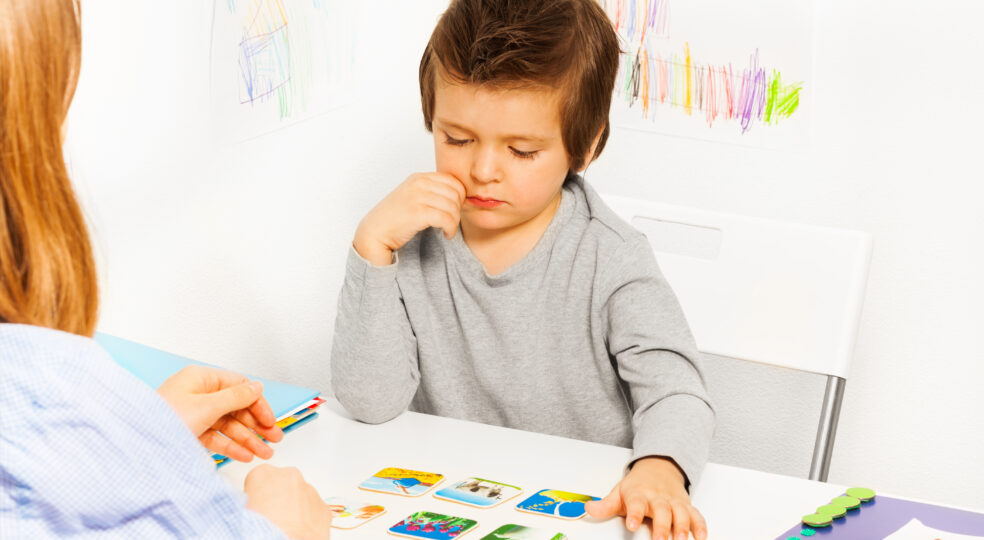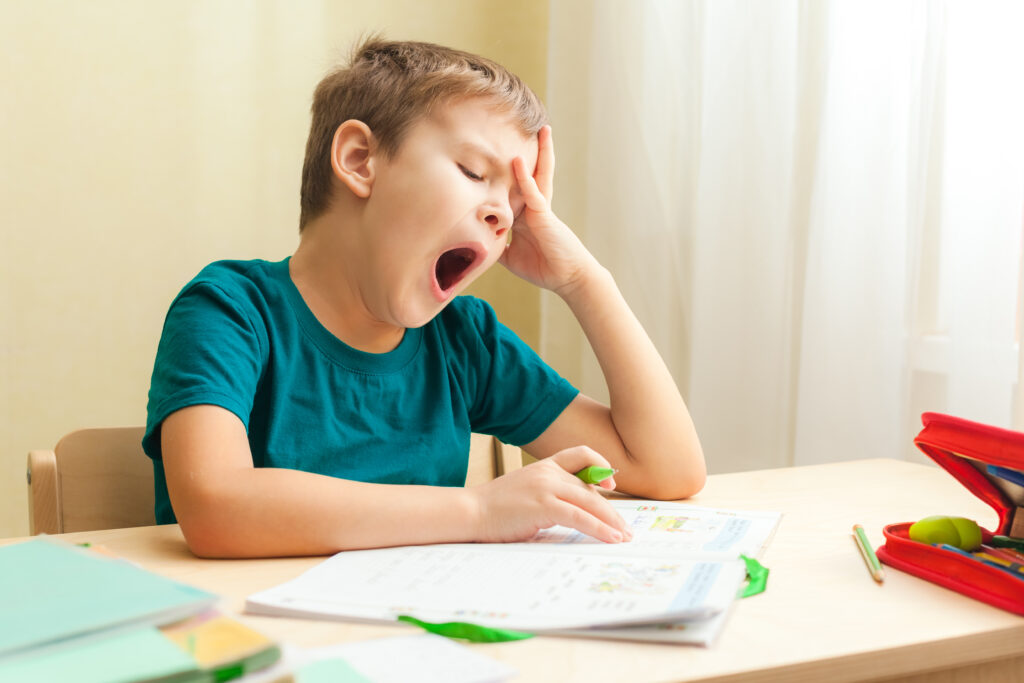
Each child develops at his or her own individual pace. This also applies to the ability to concentrate. At preschool age, it's perfectly normal for your child not to be able to concentrate on a task for more than 15 minutes. However, if the offspring is very fidgety and clearly more inattentive than their peers, most parents start to worry. But when do we talk about concentration disorders in the first place? What are the underlying causes and what treatment options are there? We would like to provide you with a compact overview of these issues below.
Is my child just a little dreamer or is there already talk of a disorder? Sometimes it is not so easy to draw this line. Not every child who likes to daydream or is easily distracted is immediately in need of treatment. This can simply be a character trait.
First of all, it is useful to define the term concentration more precisely: This is the ability to focus on a single task while largely blocking out surrounding stimuli. Since this process requires considerable mental effort, concentration cannot be maintained indefinitely.
However, children who suffer from concentration disorders are conspicuously forgetful, commit careless mistakes and appear chronically overtired. As soon as the child is only slightly distracted from the outside, he forgets what he just wanted to do. In addition, there is a high level of distress due to the striking ability to concentrate: the child can concentrate on a task for less than 15 minutes.
At the same time, it happens that tasks are completed twice because the child cannot remember that he or she has already finished the respective task. When these children think about a topic, their thoughts quickly wander. As a result, the work results - e.g. in a school essay - often do not correspond to the topic specifications.
Tip: A simple test can be used to check whether there is a concentration disorder that needs to be treated. Start a conversation with your child about any topic while he or she is drawing, writing or playing. Children without concentration disorders continue their activity without any problems.
Concentration problems can have a variety of causes. Often it is an interplay of several factors. The symptoms can develop gradually or appear suddenly. The fact is, however, that concentration problems originate in the brain.
Finding out the causes of concentration problems is important in order to find targeted remedies. Fortunately, most causes are harmless and only temporary. If the symptoms persist, a visit to the pediatrician is advisable.

The causes of concentration problems can be both psychological and physical, although the latter is more rare. Below we have summarized the five most common causes for you:
Emotional stress is considered one of the most common reasons why children are unable to concentrate at an age-appropriate level. Tensions in the family or at school can put such a strain on the child that there is no mental capacity left for learning. However, there are individual differences: Situations that one child easily masters can deeply unsettle another child.
Lack of sleep is also one of the most common causes of concentration problems in childhood. Schoolchildren aged six to nine should get at least eleven hours of sleep at night.
During sleep, the brain recovers, new impressions are processed - which is evident from the following Study emerges. If a sufficient night's rest is not guaranteed, children often find it difficult to concentrate during the day. For this reason, care must be taken to establish a regular sleep rhythm and not to let young children stay awake for too long.
Consuming media for hours on end overtaxes children, as they are not yet able to process the many impressions properly. This can lead to concentration problems. For this reason, you should never leave your child unattended in front of the TV, computer or smartphone for hours on end. It is best to agree on firm rules regarding the times of media use.
For example, children between the ages of six and nine should not watch more than 45 minutes of television per day. This figure is based on the recommendation of the Federal Ministry for Family Affairs, Senior Citizens, Women and Youth back.
Genetic causes have a rather low prevalence, but this aspect should not remain completely unmentioned. Early childhood damage, such as oxygen deficiency at birth, can also play a role. In connection with genetic disposition, attention deficit disorder (ADHD) and dyslexia are on everyone's lips.
Physical causes of concentration disorders can be, for example, hyperthyroidism, imbalances in the hormone and mineral balance or anorexia. To rule out such physical causes, a visit to the doctor is unavoidable.
Depending on the cause, concentration disorders are easily treatable. In many cases, they can even be remedied completely. A professional Coaching can make a significant contribution to this. However, coaching is not to be confused with tutoring. Instead of supporting the child in a specific school subject, the coach helps your child to activate his or her own resources.
Coaching generally means helping people to help themselves. Together, the causes of the concentration problems are identified. Once these are uncovered, the coach helps your child find strategies to better deal with the underlying issues that are affecting the ability to concentrate.
Coaching for children, just like for adults, can take place either individually or in a group. The coaching methods can differ a little from provider to provider. When dealing with children, a playful approach is especially important. The child should feel comfortable with the coaching and not perceive it as punishment.
Possible topics and methods used in coaching for concentration disorders are as follows:
Does your child seem increasingly unfocused lately? Is he or she constantly forgetting things or seems mentally absent? Then it's time to act in time, before the concentration problems develop into a serious problem. The following five tips can help:
Surely you know it from yourself: In a chaotic environment, you can hardly concentrate on the actual tasks. Your child is no different in this respect. The learning materials should therefore be in a fixed and easily accessible place. It's best to set up the workspace together with your child so that he or she can find his or her way around.
A pleasant working atmosphere also means that the entire room should be tidy and as bright and friendly as possible. Toys or smartphones have no place here, however, as they offer too much potential for distraction. On the other hand, there is nothing to be said against calming murals or a beautiful houseplant.
Concentration is subject to considerable fluctuations in the course of the day. However, it is not possible to make a general statement about the best time to learn, as each person has his or her own biorhythm. There are morning people and night owls. You can best judge for yourself which type your child belongs to.
Why not observe when your child can work most attentively? Some children are best able to concentrate on homework immediately after school because they are still in the "flow". Others, on the other hand, need a rest period first.
After a while of concentrated work, concentration automatically wanes. Once this point is passed, thoughts wander and careless mistakes creep in. Incidentally, this is the case for both children and adults. To prevent this from happening in the first place, it is important to take a break in good time.
A child can concentrate for about twice as long as he or she is old. This means that a seven-year-old should pause after 15 minutes at the latest. Let your child eat or drink a snack. He or she may also want to go outside for a moment to get some fresh air. After that, concentration is usually restored.
If a task is too easy, children quickly lose interest. If the task is too difficult, on the other hand, they feel frustrated. Both lead to a rapid loss of concentration. For this reason, it is important to find the right level of difficulty.
If you feel that your child is behaving in a disinterested manner, it is worth trying to increase the difficulty level slightly. Children want to be encouraged. If the concentration problem persists despite the adjustment made, the problem has another underlying cause.
Concentration problems occur more frequently when the material to be learned is perceived as particularly tough and dry. Concentration is therefore not infrequently a question of the Motivation. That is why it is important to make the school material as lively as possible.
Does your child have trouble with math? Then build something exciting together, for which the dimensions have to be calculated, e.g. a birdhouse or a kite. In this way, the child is introduced to the supposedly uninteresting subject area in a playful way.
Is your child having trouble with English? Then watch your favorite show or movie together in English. Or have your child translate a song lyric from his or her favorite band. There are no limits to creativity.
Tip: Are you looking for more practical tips for more concentration? Then we would like to recommend our free e-book entitled "The 10 best tips for fun and success in learning". In our free e-book learning expert Markus Hofmann shows you how to successfully guide your child through their school years.
You want to support your child even better? Then a Learning coach training be a worthwhile option for you. Our learning coaching concept is based on the principle that children are perceived as individuals with their strengths, weaknesses and preferences. Every child is different. A good learning coach understands how to identify personal Needs of each young client to be taken into account.
Becoming a parent to the Learning Coach training, however, has other advantages as well. The prevailing pressure to perform puts a strain on parents and children alike, which has a negative impact on trusting Relationship can have an impact. As part of the training, you will learn how to calm deal with difficult learning situations.
Of course, the training as a learning coach is not only aimed at parents, but also at interested parties who would generally like to work with children. As a learning coach, you have a responsible task. We teach you the most important pedagogical basics so that you can support children with tried and tested methods to rediscover their joy of learning and fun at school.
The learning coach training includes 12 intensive modules. You can start the program at any time. So what are you waiting for? Find out now about the Learning coach training and log in.

